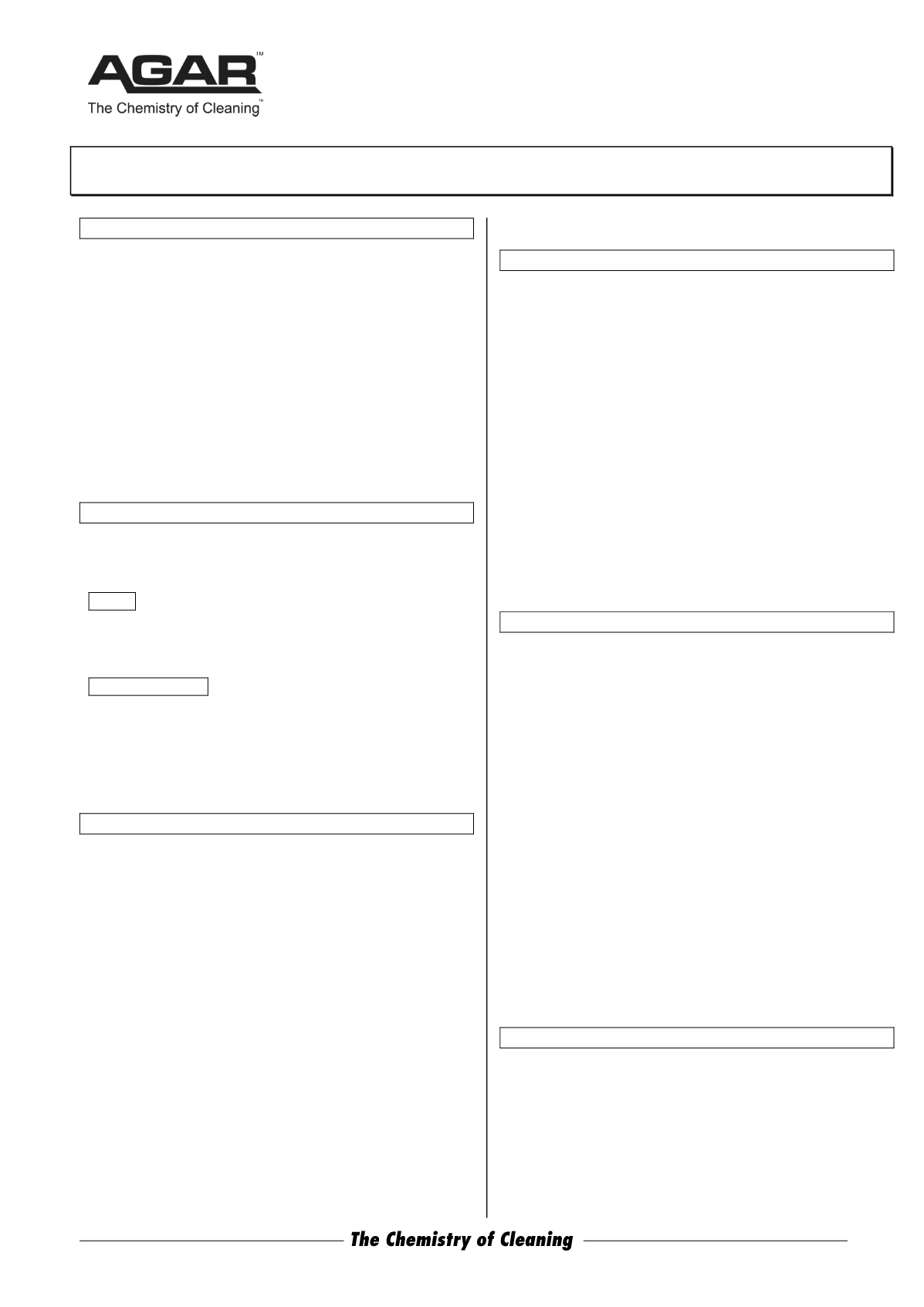

ABN 80 004 726 890 | MADE IN AUSTRALIA
VIC 03 9480 3000
NSW 02 9743 6020
SA 08 8293 2020
QLD 07 3274 3438
WA 08 9249 4566
Safety Data Sheet
Issued: December 21, 2015
Page 1 of 3
COUNTRY GARDEN
1 IDENTIFICATION OF THE MATERIAL AND SUPPLIER
Product Name:
COUNTRY GARDEN AIR FRESHENER
Other Names: Flammable Liquid, N.O.S
Manufacturer's Product Code: COU1
Product Use: Perfumed air freshener concentrate.
COMPANY DETAILS
Company: Agar Cleaning Systems Pty. Ltd.
Address: 12-14 Cope Street, Preston, Vic. 3072
Telephone: 03 9480 3000 Facsimile: 03 9480 5100
Web:
www.agar.com.auAgar SDS are available from this website.
E-mail:
admin@agar.com.auEmergency Telephone Number: 131 126
(Aust wide)
2 HAZARDS IDENTIFICATION
Hazardous according to criteria of Safe Work Australia.
Irritant Xi. Classed as Dangerous Goods
Risks:
Highly Flammable. [R11]
Irritating to eyes and respiratory system. [R36/37]
May cause skin sensitization by skin contact. [R43]
Safety Directions:
Keep out of the reach of children. [S2]
Keep away from sources of ignition. No smoking. [S16]
Avoid contact with eyes and skin. [S24/25]
Wear suitable gloves. [S37]
This material and its container must be disposed of as
hazardous waste. [S60]
3 COMPOSITION / INFORMATION ON INGREDIENTS
Ingredients:
Chemical Entity CAS No. Proportion:
Ethanol
64-17-5
> 60%
α-Hexylcinnamaldehyde
101-86-0
202-983-3
>=1 - <5%
4-(4-Hydroxy-4-methylpentyl)-
cyclohex-3-enecarbaldehyde
31906-04-4
250-863-4
>=0.1-<1%
3-p-Cumenyl-2-methylprop-
ionaldehyde
103-95-7
203-161-7
>=0.1-<1%
1-(1,2,3,4,5,6,7,8-Octahydro-
2,3,8,8-tetramethyl-2-
naphthyl)ethan-1-one
54464-57-2
259-174-3
>=0.1-<1%
Benzyl salicylate
118-58-1
204-262-9
>=0.1-<1%
Citronellol
106-22-9
203-375-0
>=0.1-<1%
(R)-p-Mentha-1,8-diene
5989-27-5
227-813-5
>=0.1-<1%
(Z)-3-Hexenyl salicylate
65405-77-8
265-745-8
>=0.1-<1%
α-Methyl-1,3-benzodioxole-5-
propionaldehyde
1205-17-0
214-881-6
>=0.1-<1%
Water and
other non-hazardous
7732-18-5
to 100%
ingredients
4 FIRST AID MEASURES
Poisons Information Centre: Phone 131 126
Swallowed:
If poisoning occurs, contact a doctor or Poisons
Information Centre – Phone: 131 126 (Aust. wide). If
swallowed and more than 15 minutes from a hospital, induce
vomiting, preferably using Ipecac Syrup APF.
Eye:
Immediately hold the eyes open and wash continuously for
at least 15 minutes with fresh running water. Ensure irrigation
under eyelids by occasionally lifting the upper and lower lids.
Seek prompt medical advice.
Skin:
Remove any contaminated clothing and shoes and flush
area with water. Seek medical attention in the event of
irritation.
Inhaled:
Remove to fresh air, rest patient and seek medical
attention if necessary. Give artificial respiration if breathing
stops. Administer oxygen if breathing is difficult.
Advice to Doctor: Treat symptomatically. Gastric lavage may be
indicated if ingested. Do not wait for symptoms to develop.
General measures should be taken to control acidosis and
maintain urine output.
5 FIRE FIGHTING MEASURES
Fire/Explosion Hazard: -
Extinguishing media: Use water, dry chemical, carbon dioxide,
or alcohol stable foam.
Fire Fighter PPE: SCBA and structural fire fighter’s uniform may
provide limited protection. Fully encapsulating, gas-tight suits
should be worn for maximum protection.
Special Fire Fighting Procedures: Use water to cool exposed
containers. Spills and leaks may be washed with copious
volumes of water, fog or spray. Firefighters must wear self
contained breathing apparatus with full face mask and
protective clothing.
Unusual Fire and Explosion Hazards: Burns with a colourless
flame. The vapour is heavier than air and may travel along the
ground; distant ignition and flash back are possible. Run off to
sewers and drains may cause explosions. Isolate for at least
800 metres in all directions if tanks or tankers are involved.
The use of compressed air for filling, discharging, mixing or
handling is prohibited due to vapour hazard. All vessels must
be earthed to avoid generation of static charges when
agitating or transferring solvents. Containers previously
holding ethanol products must be degassed before entry or
subjected to sources of ignition, refer to AS 1940.
Hazardous Decomposition Products: Burning can produce
carbon dioxide and/or carbon monoxide.
6 ACCIDENTAL RELEASE MEASURES
Eliminate all sources of iginition – no smoking. Take
precautionary measures against static discharges. Do not touch
or walk through spilled material. Stop and contain the spill for
salvage or absorb in inert absorbent material for disposal by an
approved method. Use clean, non-sparking tools to collect
material and place it in a loosely covered metal or plastic
Please turn to page 2.


















